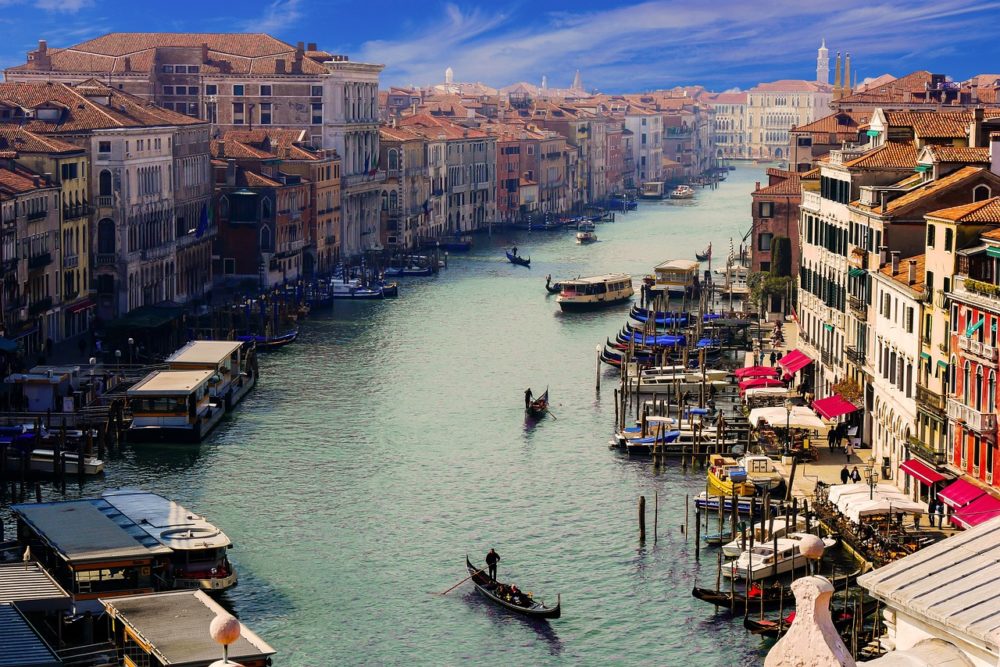Venice nets £1.7m in tourist tax pilot which critics say failed to deter day-trippers

A pilot programme charging day-trippers to Venice an entrance fee comes to an end on Sunday, with the fragile lagoon city more than 2 million euros (£1.7 million) richer and determined to extend the levy.
However opponents called the experiment a failure.
Several dozen activists gathered outside the Santa Lucia railway station overlooking a crowded canal on Saturday to protest over the 5-euro (£4.20) levy which they say did little to dissuade visitors from arriving on peak days, as envisioned.
“The ticket is a failure, as demonstrated by city data,” said Giovanni Andrea Martini, an opposition city council member.
Over the first 11 days of the trial period, an average of 75,000 visitors were recorded in the city. Mr Martini said that is 10,000 more each day than on three indicative holidays in 2023, citing figures provided by the city based on mobile phone data that tracks arrivals in the city.
Venice imposed the long-discussed day-tripper tax on 29 days this year, mostly weekends and holidays, between April 25 and mid-July.
Unesco
The project, delayed by the pandemic, was heralded by Unesco member states when they decided against a recommendation to place the city on its list of world heritage sites in danger.
Over the last two-and-a-half months, nearly 438,000 tourists have paid the tax, raising revenues of some 2.19 million euros (£1.8 million), according to Associated Press calculations based on data supplied by the city.
Officials said the money will be used for essential services, which cost more in a city traversed by canals, including rubbish removal and maintenance.
The levy was not applied to people staying in hotels in Venice, who are already charged a lodging tax. Exemptions also applied to children under 14, residents of the region, students, workers and people visiting relatives, among others.
The city’s top tourism official, Simone Venturini, has indicated that the levy will be continued and reinforced. A proposal to double the fee to 10 euros (£8.40) is being considered for next year, a city spokesman said.
Fines
Officials promised steep fines for those flouting the law, but in the end none was given during checks at entry points, which varied from a low of 8,500 to a high 20,800 a day over the period.
City officials said that is because they wanted a soft launch. Critics said it resulted in a downward trend in payments as visitors understood there was no risk in avoiding the payment.
Opponents of the plan also said it failed to make the city more liveable for residents, as intended, with the narrow walkways and water taxis as crowded as ever.
They want policies that encourage repopulation of Venice’s historic centre, which has been losing residents to the more convenient mainland for decades, including placing limits on short-term rentals.
There are now more tourist beds in the city centre than official residents, whose numbers stand at an all-time low of 50,000.
“Wanting to raise this to 10 euros is absolutely useless. It makes Venice a museum,” Mr Martini said.
Many of the banners at Saturday’s protest also indicated growing concern about the system of electronic and video surveillance that was introduced in 2020 to monitor mobile phone data of people arriving in the city, which is the backbone of the system to control tourism. Placards included warnings about use of personal data and a lack of data privacy.
“The access ticket is a great distraction for the media, which only speaks about this five euros, which will become 10 euros next year,” said Giovanni Di Vito, a Venice resident active in the campaign against the tourist tax.
“But no-one is focusing on the system for surveillance and control of citizens.”
Support our Nation today
For the price of a cup of coffee a month you can help us create an independent, not-for-profit, national news service for the people of Wales, by the people of Wales.





This makes the same point as I have been making about multiple council tax payments to discourage empty or second homes. Such taxes do not in general alter behaviour or practice rather act as a revenue source on which services come to depend. Other techniques need to be used.
It’s too early to say that, but right now the revenues should be used to buy and build more council homes, not prop up other services.
Can’t rely on councillors to see beyond their own pet projects. More money, yum yum. Providing a better supply of housing doesn’t seem to get beyond the rhetoric stage.
It should be legally ringfenced for housing. If they don’t need more council homes they can abolish their second homes levy.
Last time I went there there were 4 cruise ships docked. It was sardines in a tin crowded nuts bonkers couldn’t move. I understand the ships are now banned, which is good. But it looks like the tax didn’t deter tourists eh? Extra people above the local population need services and repairs paying for.
I went outside of this tax pilot this year,but woukd be happy to pay. I payed for Dubrovnik old city last year. Could see money at use restoring. I see no issue with this translating to home and helping pay to keep our tourists areas both alive for locals and visitors
Is it meant to be a deterrent ? Stopping huge cruise liners was a sound decision but visitors would still find ways of coming to Venice, as they do elsewhere. The levy is useful for the simple reason that it covers certain running and maintenance costs. Maybe it will need to be increased.